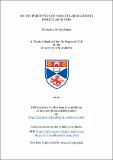On the perception of monocular regions in binocular scenes
Abstract
Our two forward facing eyes supply the visual system with slightly different
versions of the world around us. These slight differences in the two retinal
images are used to obtain depth information about a visual scene.
Conventionally, it has been assumed that points in one retinal image that do
not have corresponding points in the other image are treated as noise.
However, if one object is partially occluded by another, monocular points and
regions occur. While it is, by now, established that we do not ignore
geometrically plausible monocular points and regions, we know much less
about our percept of such regions. So far it has not been studied how our
percept of monocular regions compares to that of binocular regions and how
well we are able to use the information contained in them.
In this thesis I explore our percept of such monocular regions and ask how we
treat them in relation to their binocular surround. Using classical
psychophysical methods as well as reaction-times and eye-tracking data, I find
that we are perfectly capable of using monocular regions to interact with them
and to arrive at a stable, seemingly complete percept of them. Sometimes our
performance even benefts from the presence of a monocular region. However,
this breaks down when we are asked to integrate the information contained in
monocular regions with information in binocular regions.
The experiments in this thesis show that even though we do not ignore
monocular regions and can, if we have to, interact with them, we show a strong
preference towards relying on binocular information when given the option.
Type
Thesis, PhD Doctor of Philosophy
Collections
Items in the St Andrews Research Repository are protected by copyright, with all rights reserved, unless otherwise indicated.

